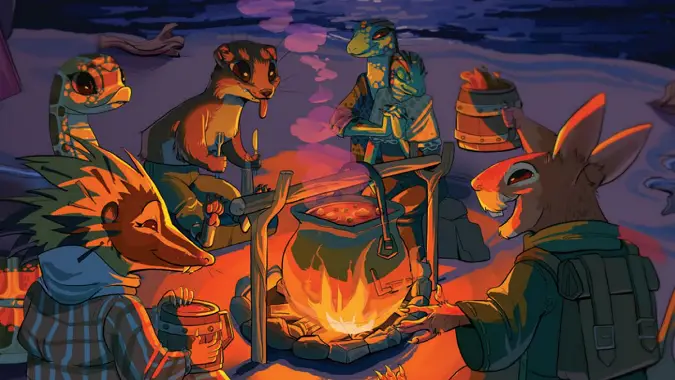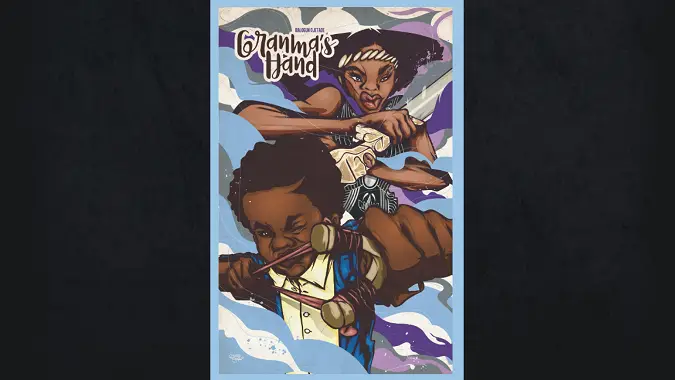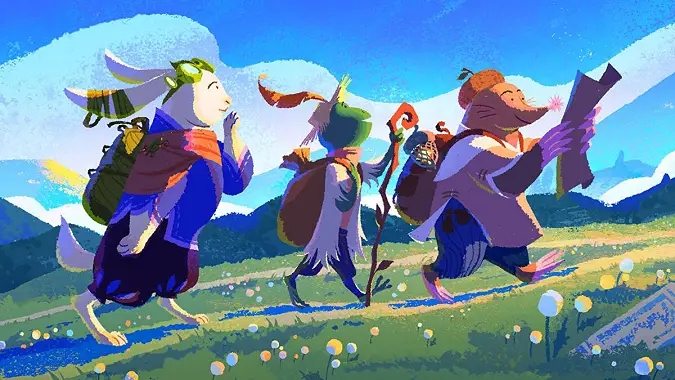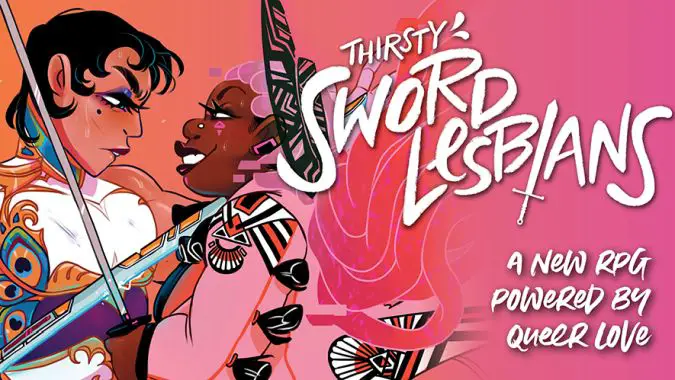Three more Nebula-nominated TTRPGs for you to try out with your gaming group

Coyote & Crow wasn’t the only TTRPG nominated for a Nebula award — an award recognizing excellence in Sci-Fi and Fantasy — this year. Three more made the cut for Game Writing. Granma’s Hand, Wanderhome, and Thirsty Sword Lesbians are each their own unique take on the tabletop role-playing genre that can make a welcome diversion from your regular campaign or even a new milieu for a GM and players to explore for years to come.
Each of these TTRPGs are a big departure from Dungeons & Dragons or Pathfinder/Starfinder so a GM should be prepared to spend time in advance of any sessions reviewing and understanding the rules as they will differ with what you and your players are familiar with. In addition, make sure to have buy-in from everyone involved to try out one of these games — as these are not your standard sword-and-laser games they broach topics and methods that players (or even the GM) may not be comfortable dealing with, so communication beforehand is critical to gaming success.

Granma’s Hand: fight for good in a world that fights against you
The Golden Age of Comic Books was the birth and foundation of the superhero archetype, dating from the 1938 debut of Superman in Action Comics and lasting into the early 50s, although the popularity of superhero comic books lost steam for some time after World War II. Golden Age superheroes were strong, patriotic, and honorable — and they were also very, very white.
Granma’s Hand takes place in a world where that isn’t true — where African-American superheroes are just as common as other races, and women are just as likely to be donning a cowl as men. The title of the game shares its name with the Justice League-style team that the players are members of. As befitting a Golden Age setting, Granma’s Hand will face off against Nazis, mad scientists, corrupt officials, and criminals — but also racist police, the Ku Klux Klan (who may have vampires amongst its members), and Jim Crow (drinking from a “whites only” water fountain will increase the amount of “Heat” on the team).
Because the focus of the game is on the story, the mechanics are deliberately light, with only a few attributes to worry about and fights designed to be quick. Players have freedom to adapt various classes (such as Bruiser, Mystic, Gadgeteer, or Speedster) with powers to match their vision of how the superhero should look and act. The sourcebook provides a few story hooks, but the GM will have to do a good amount of legwork to craft an adventure that suitably tests the heroes.

Wanderhome: where the journey is the goal
Where Granma’s Hand is rules-light, Wanderhome is rules-absent, with the game focused exclusively on the narration and interaction of the players as they journey across the fantasy RPG land of Hæth — there are no dice and no math, and even a GM is optional (players can take turn voicing NPCs), although at least one player should be familiar with the game to help guide others new to it. Based on sources like Redwall, Wanderhome characters are animal-folk of various types (some of the choices include Caretaker, Poet, and Vagabond) utilizing included playbooks to help focus their personality and actions during the journey.
What’s intriguing about Wanderhome is that its setting is fundamentally calm and meditative; while lesser conflict of a personal or emotional type could occur, there is no overt antagonism or fighting that players will have to deal with. The core belief of the game is that everyone in Hæth is fundamentally good-natured even if not strictly good, and this belief permeates everything that occurs. The result is a quiet, uplifting adventure that rewards invested players with a positive experience.
The biggest question for me is whether your standard TTRPG group would be accepting of a premise so wildly divergent from the more popular games in the industry. This is not a game for murder hobos. Instead this game may be more suited for a group of friends or family members who don’t normally play TTRPGs together, and may be a good way to introduce people to gaming altogether — but be sure to warn them before switching to a more conflict-oriented setting.

Thirsty Sword Lesbians: pretty self-explanatory if you ask me
It is so delightfully rare when a title fully encapsulates the content. Sure, Dungeons & Dragons has dungeons and dragons, but it doesn’t celebrate those things. Thirsty Sword Lesbians on the other hand is exactly what this TTRPG is all about. Utilizing the playbook framework like Wanderhome and other “Powered by the Apocalypse” TTRPGs do, TSL is less a system or setting than it is an attitude and playstyle for those who are comfortable exploring their emotions around a gaming table.
While the game is essentially setting-neutral it is still based around the standard roleplaying genres, with examples from high fantasy through steampunk to science fiction included. Whatever background the GM chooses however is secondary to how the players form relationship among themselves and with NPCs. Swordfights (or laser rifle fights) will happen, but attachments will develop as well (the game mechanic is known as “strings,” short for “heartstrings”).
For players unfamiliar with playing a disaster lesbian in a fantastic setting, the playbooks provide plenty of guidance between dice rolls. Nine playbooks are included with the core sourcebook — with ten more coming in the forthcoming expansion Advanced Lovers and Lesbians — offering options and advice for archetypes such as the Beast, the Nature Witch, and the Trickster. For GMs unsure of how to approach the game, there are several setting and adventure ideas included, so getting a game off the ground shouldn’t be too much of a challenge. The game requires substantial roleplaying effort, but don’t feel like you have to be an accomplished flirter in real-life any more than you need to be a professional fencer to fight with swords; you can always rely on the dice if you can’t come up with an appropriate romantic quip for a situation.
All four of the Nebula-nominated TTRPGs provide an opportunity for your gaming group to explore different settings and point of views that more mainstream TTRPGs tend not to focus on. While not every player may want to be experience life as an African-American superhero in 1940s America or journey between villages as a rabbit-folk troubadour, taking a chance on these games may provide an experience your group otherwise never would have had.
Please consider supporting our Patreon!
Join the Discussion
Blizzard Watch is a safe space for all readers. By leaving comments on this site you agree to follow our commenting and community guidelines.
 @Kalcheus
@Kalcheus



